
Browse our fun-packed, helpful plant-based articles, and delve deeper into this healthy, sustainable lifestyle!


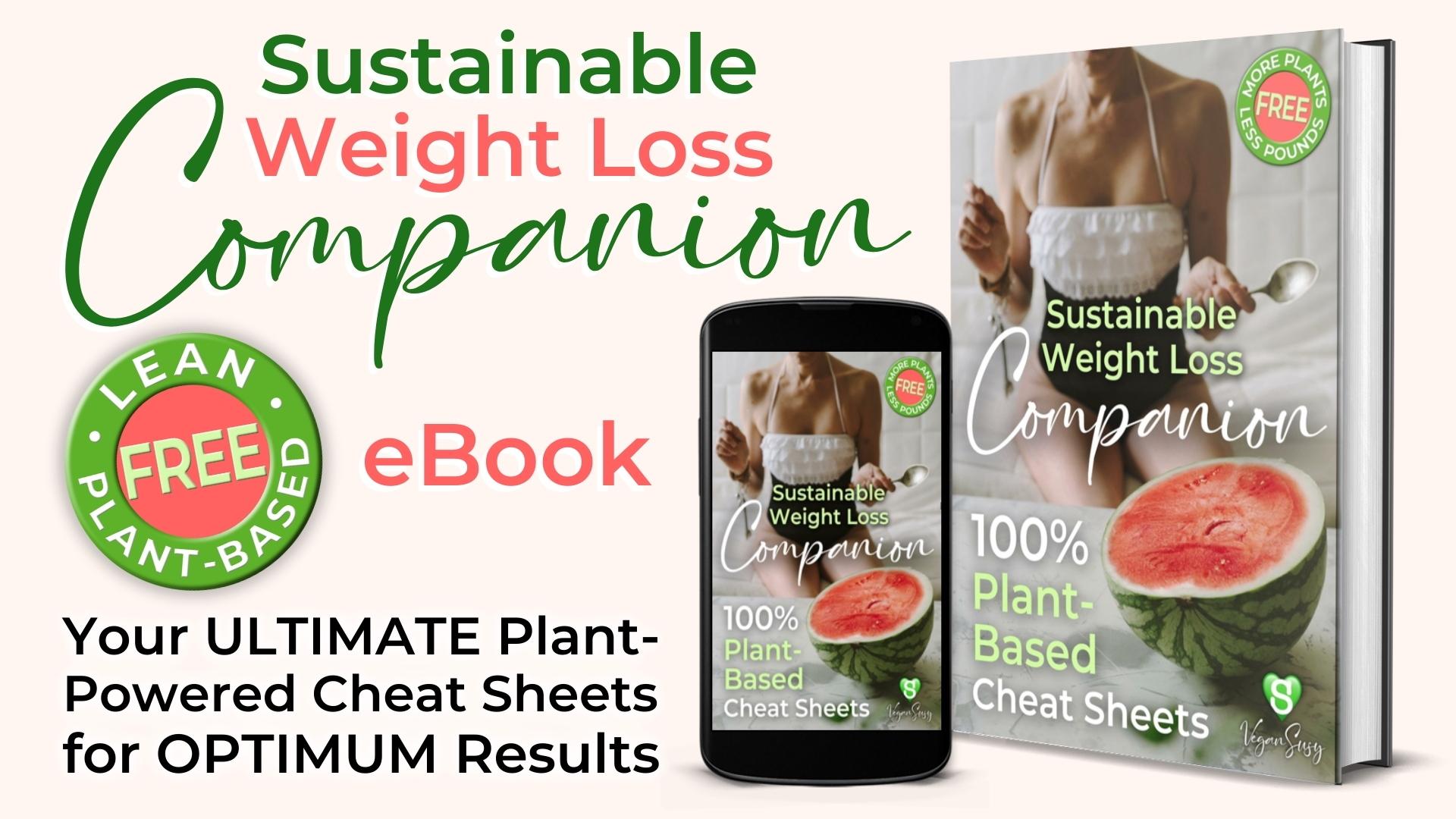

Plant-Based Strategies for Pre-Menopause Hormone Balance
Plant-Based Lifestyle Tips For Women
Author: Plant-Based Susy
Navigate this Stage of Life Feeling Healthy, Strong, and Energetic
We at Vegan Susy enjoy eating a plant-based diet for more than ethical reasons: it's a game changer for those in pre-menopause, perimenopause, and menopause by helping restore hormone balance.
Research has found that a low-fat, plant-based diet high in protein and fibre and rich in soya is an excellent strategy for creating hormone balance. Vegan diets have been shown to reduce hot flashes, produce better sleep, decrease inflammation, and lower the risk of chronic diseases.
Pre-menopause to menopause is a natural transition commonly cloaked in negativity. In this article, we'll look into the science of using plant-based strategies to create a hormone balance so you can smoothly navigate this stage of life feeling healthy, strong, and energetic.

Table of Contents:
Why a Plant-Based Diet for Balancing Hormones Pre-Menopause?
Hormones are an essential ingredient in maintaining our weight and energy levels. Their balance can be disrupted due to stress, anxiety, and when the body shifts from pre-menopause to perimenopause, usually around 40.
Thankfully, a plant-based diet can help restore hormone balance, manage your cycle, and smooth the menopause transition and beyond.
At pre-menopause, hormones typically follow a balanced cycle, averaging around 28 days, unless dealing with conditions such as pregnancy, PCOS, diabetes, and hyperthyroidism. Stress and anxiety are other common hormone disrupters during this period.
Between the ages of 30 and 50, the female body enters perimenopause and experiences a drop in estrogen. This life stage may last 8-10 years before menopause, characterized by 12 months of no menstruation. Afterwards, the body enters post-menopause.
Perimenopausal through to postmenopausal transition is associated with symptoms such as:
• Irregular menstruation
• Weight gain
• Hot flashes
• Increased sleep disruption, sleep apnoea, and/or insomnia
• Vaginal dryness
• Mood swings
• Increased inflammation
Hormone replacement therapy (HRT) is a popular strategy for dealing with the less enjoyable aspects of this life transition. However, that is not an option for many people due to specific health conditions or medical history.
In addition, many people like us at Vegan Susy prefer to manage our health through lifestyle and nutrition as much as possible before reaching for medical interventions. Fortunately, a plant-based diet is an excellent strategy for those seeking a natural way to achieve hormone balance.

Vegan Diets Reduce Hot Flashes
In December 2023, research was published from a study led by Neal Barnard, MD, that found switching to a vegan diet reduced hot flashes by 88%, compared to HRT, which has a 70-90% reduction rate.
The three critical elements to the plant-based diet's success were "Avoiding animal products, reducing fat, and adding a serving of soybeans," according to Dr Barnard, an adjunct professor at Washington DC's George Washington University School of Medicine & Health Sciences and president of the Physicians Committee.
He added that the findings reflected those found in areas "like pre-Westernized Japan and the modern-day Yucatán Peninsula…where postmenopausal women experience fewer symptoms."
The study is a huge relief for women who want to minimise hot flashes but avoid HRT.
Balancing Hormones for Pre-Menopause Weight Management
Balancing hormones helps with weight management from pre-menopause through to post-menopause. For instance, the participants in Dr Barnard's study lost an average of 8 lbs in 12 weeks on a vegan diet.
But, the benefits of hormone balance from a plant-based diet also impact men. Researchers published a paper in January 2019 that compared men eating a vegan meal with tofu to a processed meat and cheese meal.
The men who ate the plant-based meal had more gastrointestinal hormones crucial to regulating glucose metabolism and satiety.
The information is also useful for women as often hunger increases the feeling of being full decreases as the body undergoes the menopausal transition. So, a healthy, plant-based diet is a winning strategy if you want to stay fuller for longer.

Plant-Based Diets Can Reduce Perimenopause Sleep Disturbances
Insomnia and interrupted sleep are a common side effect experienced from perimenopause through to post-menopause. But plant-based diets can reduce sleep disturbances in men and women.
For instance, in January 2024, researchers published a paper demonstrating that plant-based and vegetarian diets reduced the risk of sleep apnoea by 19%.
Also, in 2020, Harvard Health published an article advising low-GI foods to lower the risk of insomnia after gathering data from over 50,000 postmenopausal women. They also observed a lower insomnia risk "in women who ate more whole fruits and vegetables."
Thus, reducing sleep problems goes beyond eliminating meat and other animal products; you must choose whole, nutrition-packed foods, too.
Vegan Diet Reduces Risk of Inflammation and Chronic Illness
As the body transitions from pre-menopause to post-menopause, the risk increases of inflammation and chronic illnesses like type 2 diabetes. But we can take an active role in managing these conditions or reducing the likelihood of them occurring by switching to a plant-based diet such as vegan.
A Study published in 2022 produced evidence that the reduction of inflammation in a plant-based diet is related to isoflavones and gut microbiota. Isoflavones are found in vegan foods like:
Soybeans
Chickpeas
Pistachios
Peanuts
Research has also shown that those already diagnosed with type 2 diabetes can work towards remission through a vegan diet. A case study series published in June 2023 found that 37% of patients achieved full remission after switching to a high-fibre, low-fat, plant-predominant diet.
Those who didn't achieve full remission still benefited from the dietary changes, achieving better glucose control and many being able to reduce their medication needs.
In addition, a plant-based, low-carbohydrate diet reduces the risk of type 2 diabetic premature death, according to a study published in 2023 by Harvard T.H. Chan School of Public Health.
Living longer and stronger on a vegan diet sounds good to our ears.
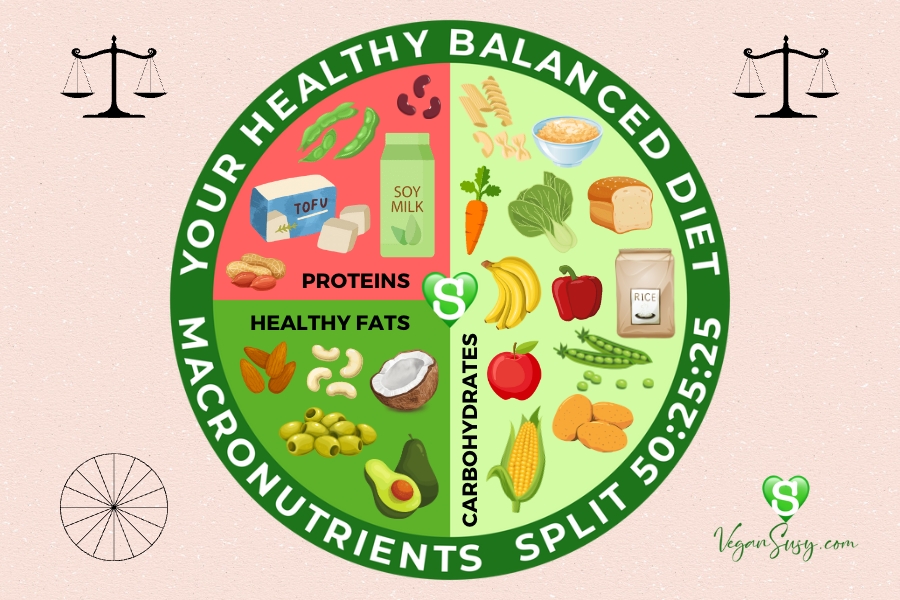
Best Plant-Based Foods for Hormone Balance for Pre-Menopause
Plant-based diets, such as vegetarian or vegan, can help a person achieve hormone balance if the right foods are incorporated into meals and snacks. However, consuming lots of sugar, fat, caffeine, and alcohol can sabotage success.
As Dr Neal Barnard's study revealed, the crucial elements to finding relief from perimenopause through to post-menopause symptoms on a plant-based diet are:
Avoiding animal products
Low-fat
Serving of soya beans
Other advice, including from the Harvard Health paper, include:
• High fibre
• High vegetable proteins
• Plenty of omega-3
• Low sugar, including carbohydrates
• Minimal to no caffeine and alcohol
Diets Rich in Soya Help Reduce Hot Flashes
Soya or Soy is a popular protein in plant-based diets. It is high in fibre, low in saturated fat, and contains omega-3 and antioxidants. Evidence has also shown that it reduces unwanted symptoms, such as hot flashes, during the transition from pre-menopause to post-menopause.
Participants in the study headed by Dr Barnard consumed half a cup of cooked soya beans each day to manage their hormones and other post-menopause symptoms. But there are other ways to include soya in your diet.
Unfermented soya options include:
• Tofu
• Soya milk
• Soya nuts
• Edamame (young soya beans)
Fermented soya products are another healthy option shown to reduce menopause symptoms. Benefits of fermented soy include:
• Reducing cardiovascular disease and cancer
• Prevent and manage neurodegenerative diseases
• Overall, there is a lower risk of mortality
Fermented soya products include:
• Miso
• Natto
• Soya cheeses
• Soya yogurt
• Soy sauce
• Tempeh
However, soya dairy products are classed as "second-generation soya-based products" along with soya burgers and other soya meat substitutes. These can be a nice addition here and there but are not as nutritionally beneficial as products like tofu and tempeh.
We like to practise the 80 : 20 rule here, focussing on soya in it's most natural state first and foremost. This split allows for occasional indulgences in more processed plant-based options, like vegan burgers when busy on-the-go or out and about with friends and family. For example vegan faux meats can be a great treat at a family barbeque
Need some soya inspiration? Check out our tasty vegan recipes, including our favourited breakfast, the tofu-based Huevos a la Mexicana.
Achieve a High Fiber Low GI Diet with Vegan Foods
The scientific literature on menopause frequently recommends a diet high in fibre but low in sugar, including avoiding simple carbohydrates. The reasoning is that sugar spikes intensify unwanted menopausal symptoms and increase type 2 diabetes risk. Thus, many people turn to a low-GI diet.
Thankfully, there are plenty of vegan options that are high in fibre and low-GI, including:
• Almonds
• Apples
• Avocados
• Black beans
• Brown rice
• Carrots (raw)
• Cauliflower
• Chia seeds
• Chickpeas
• Edamame
• Mushrooms
• Raspberries
• Strawberries
• Tofu
• Walnuts
• Quinoa
• And so much more!
(Yes, fruit can be included in a low-GI diet. However, there are some to avoid, such as watermelon and pineapple.)
Unsure how to make a healthy switch to a plant-based diet? Don't worry; we have some great advice to help guide you through the transition.

Plant-Based Omega-3 Foods for Hormone Balance
Omega-3 foods are recommended for achieving hormone balance when managing conditions like polycystic ovary syndrome (PCOS), mood disorders, insulin resistance, and weight management. However, many suggested dietary sources and supplements use animal products.
But you can find Omega-3 in plant-based foods, including:
• Algal oil
• Brussels sprouts
• Chia seeds
• Edamame
• Flaxseed oil
• Hemp seeds and oil
• Kidney (red) beans
• Nori
• Perilla oil
• Walnuts
• Wheat germ
• And more!
Plant-Based Proteins for Pre-Menopause to Post-Menopause
Protein is an essential nutrient to create hormone balance from pre-menopause to post-menopause. It's also necessary when staying fit, including elite athletes and bodybuilders. But there are many excellent ways to meet your protein needs on a plant-based diet.
Vegan-friendly protein options include:
• Buckwheat
• Black beans
• Broccoli
• Chickpeas
• Kale
• Mushrooms
• Nutritional yeast
• Oats
• Peas
• Pumpkin seeds
• Quinoa
• Seitan
• Spinach
• Spirulina
• Tempeh
• Tofu
• And more!
So, if you don't enjoy protein powder, you're in luck, as it isn't necessary when eating a healthy, balanced vegan diet.
However, if protein powder is your jam, there are vegan-friendly whey-free options, often made from pea protein. However, you might want to avoid other common ingredients such as:
• Artificial sweeteners, like sucralose and aspartame
• Added sugar
• Maltodextrin and other fillers

Exercise as Part of a Hormone Balance Plant-Based Strategy
A plant-based strategy for pre-menopause hormone balance needs to include exercise. Getting a minimum of 150 minutes of moderate-intensity or 75 minutes of vigorous-intensity per week is recommended.
Exercise helps balance hormones naturally by increasing levels of endorphins. Studies have also shown it reduces insulin resistance, type 2 diabetes, and metabolic syndrome. Getting the body moving is also an excellent method for managing appetite and weight.
Ready to get the heart pumping? Consider jogging for joy or other fun activities, including:
• Dancing
• Cycling
• Martial arts
• Hiking
• Table tennis
• Rowing or kayaking
• Walking
• Weight-lifting
• Body-weight strength training
Those looking for low-impact ways to get the heart beating while managing joint pain consider:
• Belly dancing
• Hula hooping
• Pilates
• Tai chi
• Swimming
• Water Aerobics
• Yoga
Those going through the menopause transition are highly recommended to include strength training in addition to cardio in their weekly workouts. Building muscle helps prevent musculoskeletal issues like osteoporosis and provides the body with joint support.
Breathwork is also useful for managing your emotional reaction to the body's changes and riding the waves of symptoms like hot flashes, stress, and anxiety. Breathwork can be learned and practiced through specific courses and training, meditation, singing lessons, yoga, and Pilates.
Frequently Asked Questions
Do pre-menopause women on a plant-based diet need B12?
Pre-menopause women on vegan or other plant-based diets should take a B12 supplement or integrate fortified foods into their nutritional plan.
Vitamin B12 is mainly found in animal-derived products, so eating plant-based foods with added B12 or supplementation is necessary for anyone who doesn't eat meat, fish, eggs, and dairy.
Around 1 in 20 omnivores are deficient in this vitamin and could also benefit from taking B12 supplements.
Do vegans need to supplement iodine?
Not all vegans need to supplement iodine. It is naturally available in seaweed products like nori, kelp, and kombu. Sea vegetables like sea moss are also an excellent plant-based iodine source, as is Spirulina, a nutritious fresh or salt water algae. However, some vegans not into seafood find some iodine supplementation beneficial.
Will a plant-based diet treat Hashimoto's or hypothyroidism?
While vegan and other plant-based diets can help achieve hormone balance, they are not a substitute for following professional medical guidance when managing Hashimoto's, hypothyroidism, or other thyroid issues. Certain foods can exacerbate these conditions or interfere with necessary medications.
Can soy-based foods help with hormone balance?
Yes, soy contains phytoestrogens that mimic estrogen, helping reduce hot flashes and balance hormones during menopause.
How does a vegan diet help with menopause symptoms?
A plant-based diet reduces inflammation, balances hormones, and minimizes hot flashes, helping manage menopause naturally.
Conclusion:
Plant-based diets like vegan are an excellent strategy for achieving hormone balance, especially when embarking on the transition from pre-menopause. They can help you feel full for longer and reduce hot flashes, inflammation, and the risk of type 2 diabetes. However, it's essential to eat low-fat, high fibre and protein foods, especially soya beans. Also, avoid excess sugar and refined carbohydrates.

💚 "Happy Plant-Based Eating & Exercising!" 💚

Plant-Based Susy
Plant-Based Nutrition Professional & Weight Loss Coach
Empower Yourself: Embark on a Delicious Fat Loss Adventure

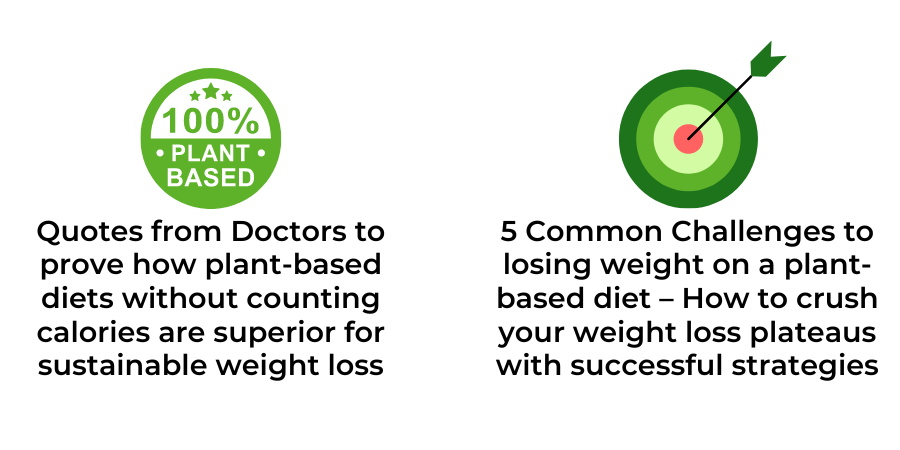
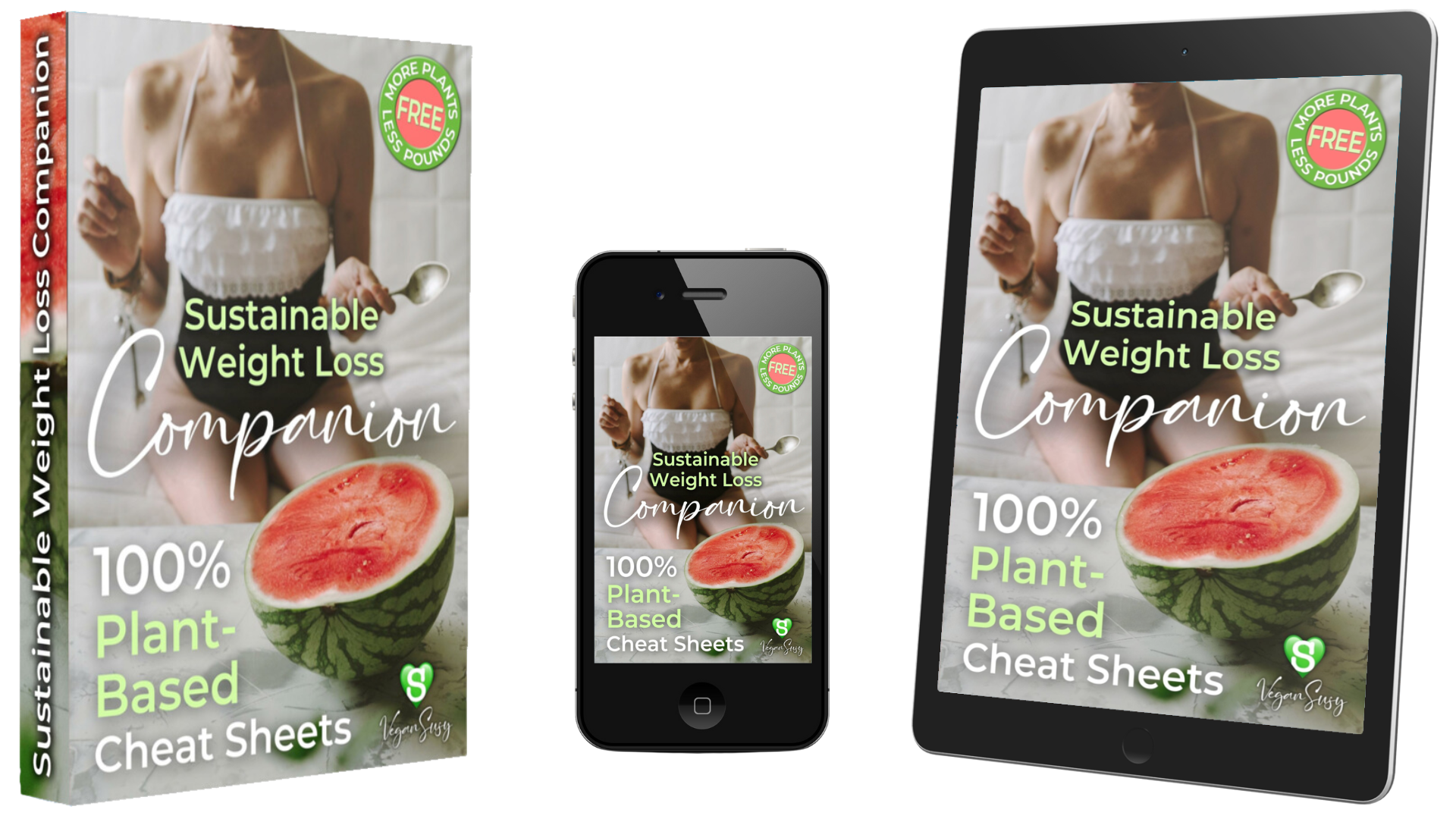
🍉 Get Ready to Jump Start Your Fitness Goals AND DISCOVER A HEALTHIER YOU!
🍉 Let's Make Your Fat Loss & Optimum Health Journey a Delicious Success Story!
🍉 Get The FREE Sustainable Weight Loss Companion eBook and CHEAT SHEETS!
More Free Resources
Unlock Your Transformation Today!
© 2025 VeganSusy Ltd. All Rights Reserved


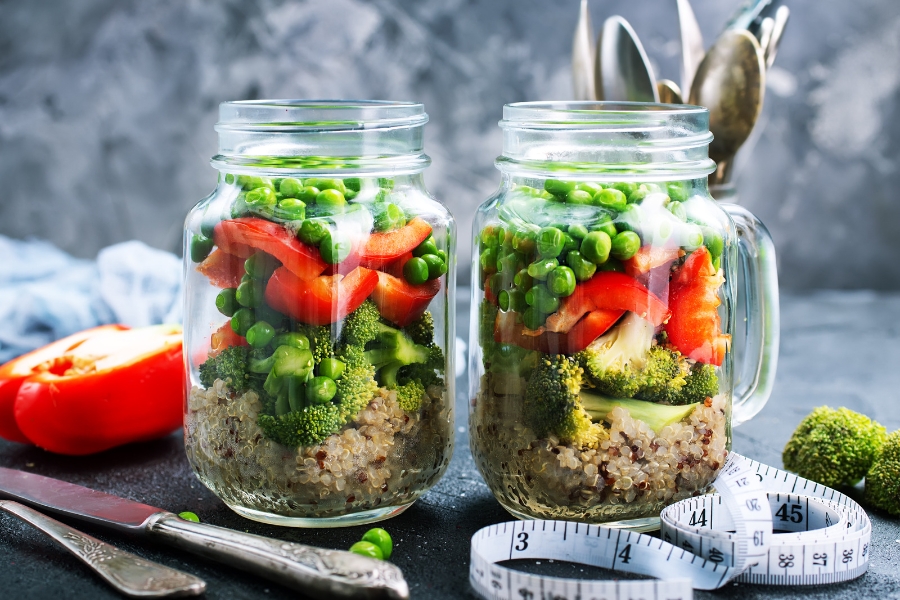
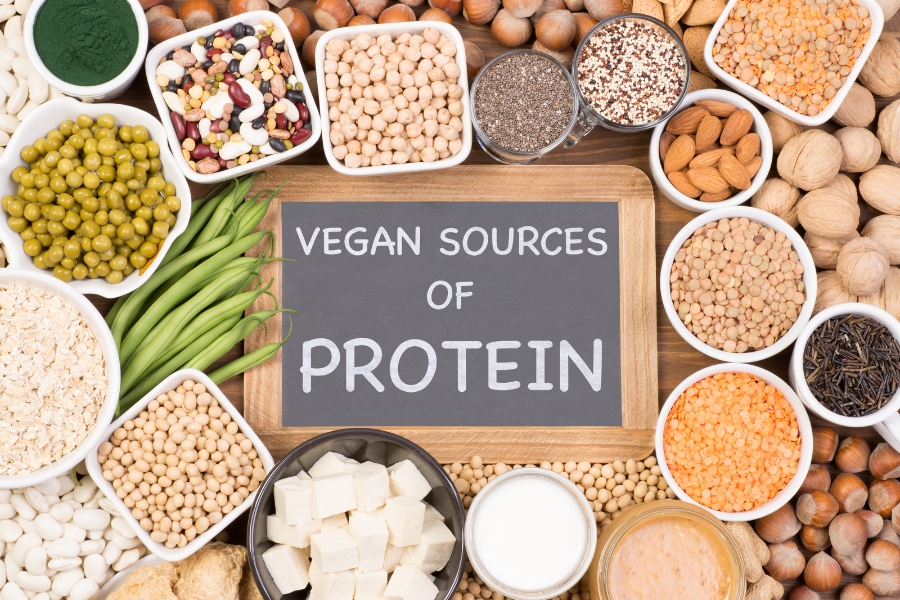

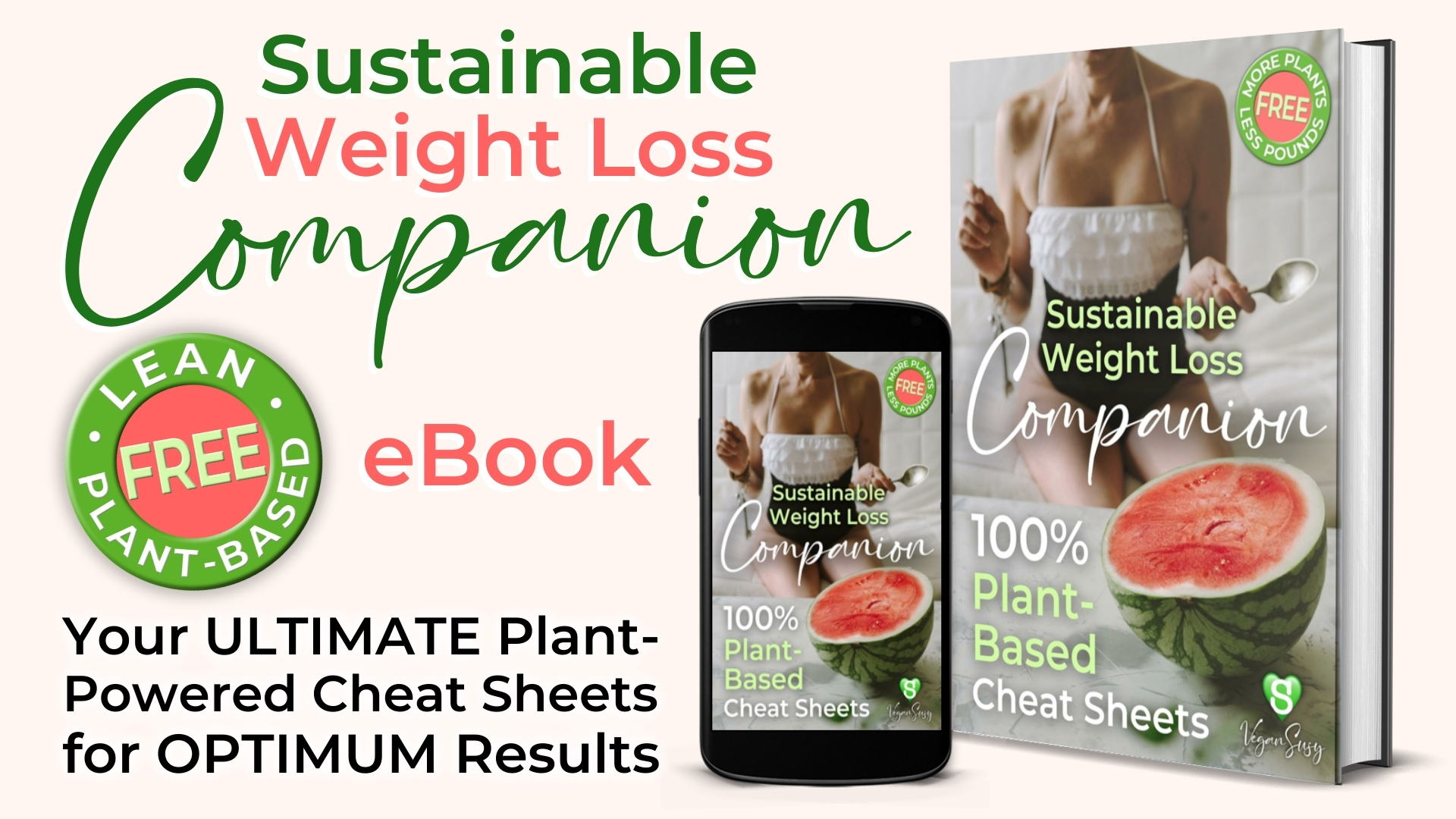





Facebook
Instagram
Youtube
Pinterest